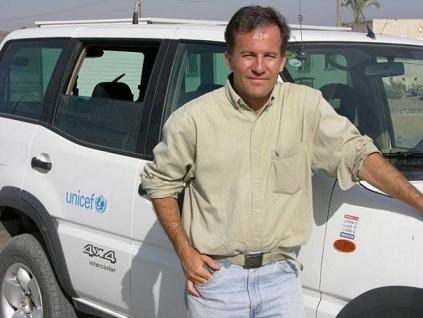 |
| MIchael on the road with UNICEF. |
When major disasters occur around the world; earthquakes, tsunamis, famine and war, it is very difficult to get help right away. Often roads are washed out, bridges gone and communication cut off. This is where the first responders come in. They are the first people on the ground with medical supplies, food, fresh water and hope. Michael Bociurkiw has been a first responder for UNICEF for almost a decade. Also called an Emergency Communications Worker, he assesses the situation and lets the United Nations and the World Food Program, local NGOs and the world press know what is needed the most and how best to get it there. In his line of work, Michael has witnessed a lot of horrific events. My Hero asked him where he finds his hope. "When I see UNICEF and others bringing about positive change - whether in a man-made or natural disaster - that gives me hope. When I see the resiliency of the most down-trodden men, women and children - that gives me hope. Their ability to survive, re-build and thrive amidst incredible adversity."
Michael Bociurkiw is a Canadian national, educated at Carleton University (Ottawa), with a certificate in TV News from the Columbia University Graduate School of Journalism Summer Institute. Michael was raised in Canada and as a child he always wanted to be a pilot. Training to become an aviator is still on his "to do" list and he thinks of it as a "skill that could come in handy during an emergency in the field." Michael told me, "I always knew that I would be a socially responsible person. Since about the eleventh grade I have been involved in student and community organizations - devoting hundreds of hours to worthy causes.
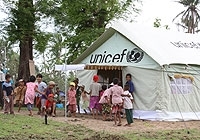 |
| Children play outside of a UNICEF supplied tent (UNICEF) |
In calamities of this scale, one can only imagine the horrific nature of what first responders like Michael are witness to. Michael recently told the CBC that, "In any disaster you take away images that keep you awake at night. I remember when we landed in an isolated area with these huge UN helicopters… we were trying to land in huge winds onto muddy ground and the state of the people that approached us… we just felt an overwhelming sadness. There were mostly men and not many children under 5 because they had literally been blown away by the storm." Michael was taken aback by the lack of fishing and planting as well as the absence, not just of little ones, but of the water buffalo so essential to the farming communities in this rice belt. "One of the worst things that has happened is that so much sea water has come in, and ruined ponds and fields with salt water. It's very hard for people to access clean drinking water." Some of the first and most essential provisions to make their way to these devastated areas are water purification tablets and pumps to drain the salt water so that monsoon rains can replenish the land. But for Michael, the agricultural set-back isn't the worst of it. "This is really a children's catastrophe, a lot of the infrastructure like schools and playgrounds and medical clinics are gone. Hundreds of children lost either one or both parents, so they are very vulnerable and require a lot of assistance."
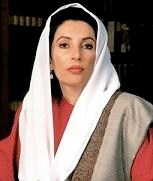 |
| Benazir Bhutto (cafecrem.wordpress.com) |
The reason I went into journalism was to make a positive contribution to society - whether this involved uncovering corruption, organized criminality or just bureaucratic sloth. My high sense of public service must have been inherited from my mother, Vera." His mother currently resides in Edmonton and Michael credits her for sharing the burden of his work by listening to his stories from the front lines, giving him that sounding board so critical to those who witness the unspeakable. Michael also credits his desire to "give back" to his late father. Bodhan Bociurkiw is one of Michael's heroes, "for his bravery as a young man and for infusing me with the ability to tell right from wrong." Another of his heroes is former Pakistani Prime Minister Benazir Bhutto, "for her incredible bravery."
Aid workers and journalists know something about bravery and what it is to be afraid. Michael shared several such experiences, "I was afraid once on a high altitude landing pad in Pakistan controlled Kashmir, when I suffered a slight fall from a departing military chopper. There have also been some tense moments at Israeli controlled check points in the West Bank and Gaza."
I asked Michael if there was a moment that stood out, an event that made him think, 'this is the work I have to do.' He replied, "Yes in 2001-2002, when I was in "no man's land" on the Afghan-Tajik border and met a young woman in her teens who was caring for several of her younger siblings in the most rudimentary of shelters. Both parents had gone missing or had been killed by the Taliban. I thought to myself - these are the children we need to protect." He has covered many disasters, both natural and man-made, the most recent being Myanmar (formerly known as Burma). After Cyclone Nargis hit on May 3rd, 2008, killing more than 85,000 people, it took 2 1/2 weeks for the ruling Junta to grant entry visas to a few UNICEF aid workers. One of the first to arrive in Yangon (formerly Rangoon) was Michael Bociurkiw with UNICEF. He said, "When we arrived in Rangoon there was no movement on the ground, just an eerie silence." This was in stark contrast to arriving in Pakistan after their major earthquake a few years earlier, where "you could hardly move around on the ground, there was so much activity going on with helicopters, aid trucks and workers." Because it took so long for anyone to get into Myanmar, the world did not know what was really happening there or the extent of the devastation. According to Michael, at scenes of devastation like this, there are normally journalists in abundance, but in Myanmar there were "only a few stringers and Myanmar nationals and they had to be very careful." Michael had a satellite link that "allowed us to do a live feed from wherever we were." This allowed them to send sound and images to studios worldwide to let everyone know the extent of the disaster. "Media in any disaster is a real partner of ours and other aid groups. In all the years I've worked for UNICEF the media has helped us get the word out and show how aid dollars are used." In this case most of the media had to stay in Bangkok, Thailand and be satisfied with twice weekly briefings by Michael and other aid workers.
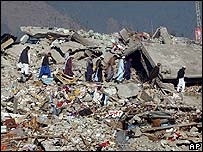 |
| Pakistan Earthquake (google.com) |
Michael is one of those few who live and work on the leading edge of global trauma, so when he speaks it's hard not to lend an ear. "Don't forget the downtrodden." That's the message he puts at the top of things he'd like to tell you. "Don't forget the young victims of long-running disasters - such as the Israeli-Palestinian conflict and in Darfur." But the world's troubles are many and someone like my hero, Michael Bociurkiw has several issues he considers urgent. "I would also speak about the impact of climate change on vulnerable countries such as Bangladesh, the Philippines and Myanmar. If we do not act now it may cause irreversible damage." One of his challenges is to keep the world's downtrodden and vulnerable in the eye of global media. "One of the issues I am devoting much thought to these days is how we can work with media - especially major broadcast outlets - to improve coverage of development issues, developing countries and emergencies. It's an interesting field as many media organizations are now turning to 'citizen journalists' and aid organizations to gather information."
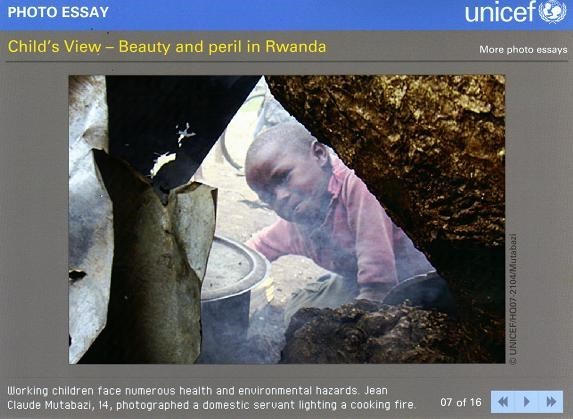 |
| Click on EYE SEE III PROJECT in the links below. Then scroll down to Child's View - Beauty and peril in Rwanda to see the rest of the amazing photos taken by children. (unicef.org) |
To that end UNICEF has launched a fascinating photographic project called EYE SEE, that was designed to empower children while endowing them with the skills and equipment to document their surroundings. The idea is to put cameras into the hands of those in the eye of the storm. "Dozens of children in Pakistan, Liberia and Rwanda have already benefited from these workshops and many said afterwards that they would like to become professional photographers." By taking Eye See exhibits to developed countries such as the United States, Canada and Japan - these stunning photographs give audiences an intimate opportunity to see a world captured through the eyes of young people." Any profits realized by the photographs buy much-needed mosquito nets that are donated back to these countries.
Michael Bociurkiw is a man of many talents: a wonderful cook who has thrown dinner parties from Amman to Islamabad to Jerusalem, an avid long-distance cyclist, a world traveler, a future author, a good son and a good human being. When asked if he had a favorite quote, he left me with, "May you live in interesting times!" It's a Chinese saying that is seen as both a curse and a blessing. "It sums up my life," says Michael, "I have been blessed to live in interesting places and times."
Page created on 7/30/2008 12:00:00 AM
Last edited 12/12/2016 7:53:19 PM
Michael Bociurkiw has lived in Britain, USA, Geneva, Jerusalem, Hong Kong, Manila, Kuala Lumpur, Cairo and most recently landed in beautiful Sidney, British Columbia, Canada. As a former journalist, Michael spent the bulk of his writing career covering such major events as: the Chernobyl nuclear disaster in Ukraine, the explosion of Mt. Pinatubo in the Philippines, the handover of Hong Kong to China in 1997, and the Tiananmen Square crisis in 1989, as well as covering major global summits like the 2002 G-8 Summit in Calgary. He has interviewed many world leaders, held staff positions at the Toronto Globe and Mail and South China Sunday Morning Post, served as the Malaysia Bureau Chief for Asia Times (Bangkok) and been a contributor to Forbes Magazine, MSNBC and the Los Angeles Times.
His most recent postings include: UNICEF Egypt as Communication Section Chief; UNICEF Canada as media consultant; and Geneva Regional Office (as global spokesperson). From February 2004 to mid-2006 Michael served as Communication Officer for UNICEF OPT in E Jerusalem. In October 2005 he was deployed to the Pakistan Country Office to lead communications for the South Asia Earthquake, and again in mid 2006 as acting chief of the Communication Section. His other emergency work includes the second Iraq war (based in SE Turkey) and the Afghanistan emergency in 2001 (based in Tajikistan). During all of these postings Michael worked with a vast array of media outlets. He has appeared live and on tape on BBC, CNN, CBC, NPR, among others. He has directed the launch of three major country office websites - in the Occupied Palestinian Territory (OPT), Pakistan and Egypt (Arabic version). He is a trained videographer, proficient in digital shooting and editing.
